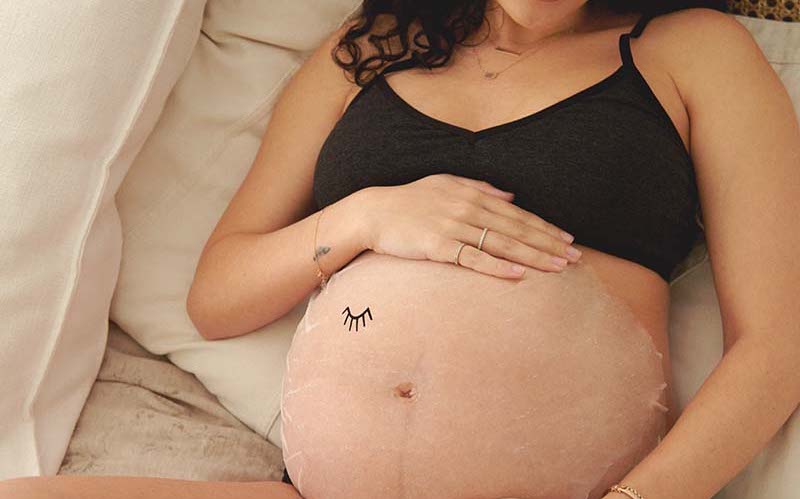When your body is working hard to create an entirely new human, it undergoes all kinds of changes. Unfortunately, sometimes this also means hot flashes and waking up drenched. While a sweaty night is a normal and common part of pregnancy, it’s a less-than-comfortable side effect.
We have tips that can help you get a better night's sleep while dealing with pregnancy night sweats.
When does sweating start during pregnancy?
While increased perspiration may occur throughout all stages of pregnancy, including during the postpartum period, night sweats are most common during the first and third trimesters.
During the second trimester, things may settle down a bit as hormone levels stabilize, and some may find that night sweats or sudden heat waves become less intense. However, by the third trimester, sweating often ramps up again. As the body works harder to support the growing baby and prepare for labor, changes in circulation and metabolism can lead to feeling overheated more often—especially at night.
Postpartum, sweating can continue as the body adjusts back to its pre-pregnancy state. This is largely due to shifting hormone levels and the body shedding excess fluid retained during pregnancy. Many new parents find themselves waking up drenched in sweat in the first few weeks after birth, even in a cool room. You may also experience sweating (and itching, but that’s another story) during the postpartum period. This is because the body is working to return to its pre-pregnancy hormonal equilibrium after delivery.
What causes sweating during pregnancy at night?
Night sweats, or nocturnal hyperhidrosis, is a normal symptom of pregnancy, but why does it happen? Pregnancy night sweats are brought on by a few factors, including:
- Hormonal change. During pregnancy, you go through a lot of changes as your body prepares to care for the baby. This fluctuation in hormone levels is one of the main factors of many pregnancy symptoms, including increased sweating.
- Faster metabolism. Your body is working for two, and as a result, its heightened metabolism burns more calories at a higher rate, generating more heat in the body.
- Increased blood circulation. This is also heightened as the body supplies blood to both the mother and the baby. The blood vessels dilate near the surface of the skin, making the body feel hot and the skin warm to the touch.
- Temperature swings. As your heart and lungs work harder to pump blood and oxygen to the growing fetus, it can cause swings from hot to cold. This is your body’s effort to regulate its temperature during pregnancy.
- Medication. Some medications are prescribed to help with pregnancy symptoms like nausea. However, many of these medications may prompt increased sweating as a side effect.
- Illness. Although in most cases night sweats are a normal part of the pregnancy journey, sometimes they can be a sign of e your body’s response to a fever, cold, flu, or another illness. If you think your excessive sweating could be indicative of a fever or infection, consult your healthcare provider immediately.
In addition to finding safe and comfortable pregnancy sleeping positions, night sweating is another burden on sleep for moms-to-be. Luckily, there are some methods you can try to ease night sweats.
How to manage night sweating
If you find yourself late at night searching “night sweats pregnant,” here are some tips to try and cool your temperature:
- Drink more water in the morning. Increase your fluids early in the day to stay hydrated, but stop drinking water right before bedtime. Getting up to use the bathroom in the middle of the night may disrupt your sleep cycle and cause more heat flashes.
- Turn the AC up. Use a fan or air conditioner to increase airflow in your room at night.
- Use summer bedding. Sheets that are lightweight and breathable can help you keep cool and wick away excess moisture.
- Wear breathable clothing to bed. As with bedding, dress in lightweight clothing to stay cool while pregnant. Cotton is a great fabric to help oxygen flow to your skin and keep you cooler.
- Avoid certain foods before bed. Carbs, caffeine, alcohol, spicy food, and sugar are typically triggers for excess sweating.
- Run a cool shower. Taking a rinse during the day or right before bed can help reduce your heart rate, one of the reasons for your increased body temperature throughout pregnancy. It can also help you feel clean and refreshed after a hot flash.
Hopefully, this list will help you manage your night sweats and bring you ease at night. Remember that it’s normal for your sleep to be disrupted or for your sleep habits to change. If you feel like it’s impacting your quality of life, talk with your doctor about solutions that meet your unique needs.
When Should You See a Doctor About Night Sweats?
Night sweats are a common part of pregnancy and are usually nothing to worry about. However, if they come with other symptoms like fever, chills, or signs of infection, it is a good idea to check in with a healthcare provider. This can help ensure everything is on track and provide peace of mind.
Stay cool and sleep tight with Nanit
Pregnancy is an intense process. Hot flashes and pregnancy fatigue just add to the many uncomfortable symptoms. Between hormone fluctuations, increased blood circulation, and a higher metabolism, the changes your body goes through are extreme.
Do your best to find time for your own self-care during pregnancy with Nanit. Unwind with our Hatch Collection Belly Besties Bundle, or combat headaches and tweaks with the Rescue Me Bundle. The Vitruvi Stone Diffuser with Sleep Oil can also bring calm to a long day of creating new life.
While we can’t stop the night sweats, we can provide thoughtfully designed products to make your experience a little bit more comfortable.
Key takeaways
- Night sweats are a common, normal occurrence during pregnancy, through every trimester into post-partum.
- Increased perspiration is caused by bodily changes, including hormone shifts, increased blood circulation, and heightened metabolism.
- Sweating can be abated with lightweight clothing and bedsheets, air conditioning, night showers, and limiting trigger foods.
Sources
Verywell family. Excessive Sweating and Night Sweats in Pregnancy. https://www.verywellfamily.com/sweating-during-pregnancy-4687125
Nct. Pregnancy hormones: progesterone, estrogen and the mood swings. https://www.nct.org.uk/pregnancy/how-you-might-be-feeling/pregnancy-hormones-progesterone-oestrogen-and-mood-swings
theCheckup. What causes night sweats during pregnancy—and how to find relief. https://www.singlecare.com/blog/night-sweats-pregnancy/
International Journal of Nursing and Midwifery. Prevalence and factors related to hot flashes and night sweats in postpartum women in Japan. https://academicjournals.org/journal/IJNM/article-full-text-pdf/6831BBD62982
WebMB. Can What You Eat Make You Sweat? https://www.webmd.com/skin-problems-and-treatments/sweat-how-food-affects
NIH. Prospective Evaluation of Hot Flashes during Pregnancy and Postpartum. https://www.ncbi.nlm.nih.gov/pmc/articles/PMC4167790/








































